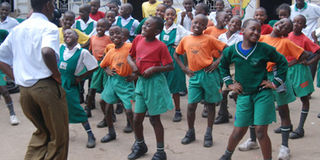Finding solutions to low achievement in school

Children of different ages have different concentration levels. It is important that they are allowed time to play. File Photo
The quality of education in any given country tells a lot about its current and future human resource abilities. Some scholars and economists argue, basing on this that when the education component is taken care of there is assurance of having archiving dreams like the much touted idea of a “sustainable integrated and self-sustaining national economy.”
However, in Uganda today, the picture on the ground is different. Right from primary to University, children grow up targeting only to pass exams with little or no other competencies attained through the entire education cycle. This can be better explained by numerous reports that have shown that a good number of pupils mostly those under the free education programme can hardly read or write their names or work out a simple equation in mathematics. It is against this worrying trend that the ministry of education through the Directorate of Education Standards is planning to conduct a special survey in all primary schools countrywide to find out what could be the cause of low attainment of numeracy and literacy competence and suggest possible interventions.
According to Ms Frances Atima, the principal inspector, secondary education standards, their focus will be on school level assessment so that individual school interventions can be put in place as an integral part of regular school inspection to reverse this trend.
“Competences in literacy, numeracy and life skills are essential for the pursuit of lifelong learning and career opportunities and we admit that many of your school going children lack that,” she said.
She says their first focus will be on supporting supervision of the teaching and learning process before concentrating on monitoring of learning achievement and later do a follow up inspection to ensure that schools are implementing the recommendations or agreed interventions .One of the reports published by non-governmental East African region education quality tracking project Uwezo last year discovered that Primary Leaving Examinations candidates under the UPE scheme cannot read ,let along comprehend a passage of Primary Two level. They cannot count either. The findings further revealed that nine out of every 10 children in P3 could not read and understand a story in English of a P2 level difficulty, seven out of every 10 children in P3 could not solve numerical sums still at the same level while seven out of every 10 in P3 to P7 could not read and understand a P2 level test.
Ms Atima says the assessment which is likely to start next term or in the first term of 2013 will focus on the three key competences (numeracy, literacy, life skills) and other factors which influence learning .The pupils to be assessed are those in P2 as they are set to complete the lower primary, P4 –being a transition class from Thematic curriculum to subject based and P6 for upper primary.
“We have been coming up with blanket interventions which have not helped us much. But this time round we shall be administering test items ,questionnaires and interviews in all primary schools both government and private to know exactly from the learners what the problem is and we hope we shall get individual learner’s needs .” she adds
According to Ms Atima, marking of tests will be done at school level by teachers under the supervision of district inspectors and associate assessors, and thereafter, the latter will be sharing the findings with teachers, parents and school management committees before leaving the school.
“They will be working in pairs and spend a day in a school” she says. She said the exercise will be conducted every year to assess the progress.
“This kind of assessment will be carried out annually in second term of the school calendar to help us provide and maintain a sustainable monitoring system that ensures that learners are really achieving the desired competencies,” she adds.
The education ministry has put aside Shs1billion for this particular exercise this financial year.
The ministry will draw lessons from Mauritius where monitoring of learning achievement in schools has helped improve pupils’ understanding of what they learn in class from 56 percent to 70 percent. A 2010 report by National Assessment of Progress in Education (NAPE) revealed that literacy at Primary 3 and Primary 6 was as low as 47 percent and 40 percent respectively while in numeracy, the average achievement in P6 stands at 40 percent.
Although the country boasts of approximately 8.3million in primary school, compared to 2.3million before the introduction of UPE, there is indeed nothing to celebrate if majority of pupils, though in school, are not able to read and later on deal with numbers.
The education ministry has for the last five years been get a lion’s share of the national cake and on average, Shs100billion is earmarked for basic education annually and a big portion usually goes on paying teachers’ salaries and putting up infrastructure .
In 2010 /11 and 2011/12 fiscal years, the sector enjoyed the biggest share of the national cake with an allocation of 1.39trillion and Shs1.418trillion respectively. In 2009/10, the ministry got Shs1.079trillion, down from Shs899billlion in 2008/09. In 2012/13, the sector budget has climbed to Shs1.669trillion, representing 17 percent of the total budget.




